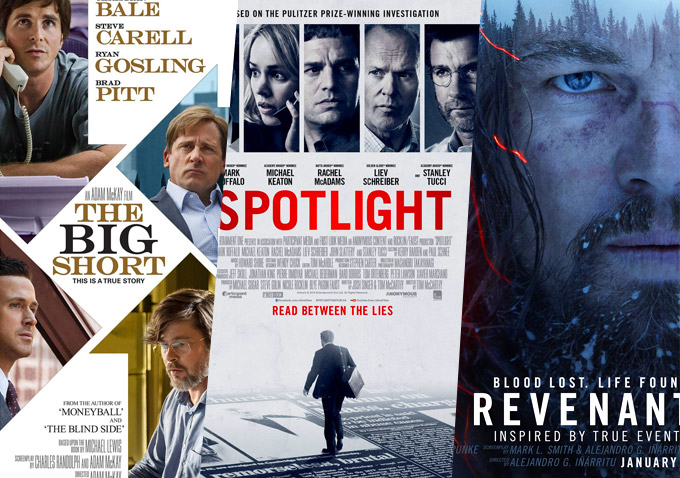Well, that was exciting. Going into yesterday’s Oscars, most prognosticators were predicting and expecting “The Revenant” to win Best Picture — it was a huge hit, took the BAFTA and the DGA (the guild that most often lines up with Best Picture), and was widely expected to win Best Actor and Best Director, which it did. Those that weren’t backing Alejandro Gonzalez Inarritu’s film tended, like ourselves, to predict that “The Big Short” was best placed for the big prize, having taken the PGA Award.
But instead, in one of the more pleasing curveballs in recent Oscar memory, the Best Picture trophy went home to the makers of “Spotlight,” Tom McCarthy’s sober, understated drama about the Boston Globe reporters who helped reveal systematic cover-ups of child abuse in the Catholic Church in the city (and elsewhere). A few astute prognosticators had backed it (aided by its wins with the SAG), but not many, and given that before it won Best Picture last night, the film had only won one other award, even they must have been feeling shaky. So what happened? How did the dark horse triumph over its bigger competitors?

It’s a complicated question, but the simplest answer is: the preferential ballot. Introduced in 2009, the new system asked voters not just to pick their favorites, but to rank all of the Best Picture nominees (this year, from 1-8). If a movie gets over half of the first-choice votes, it wins, simply enough. But if no film has a majority, the movie with the least number of first choice picks (let’s say for sake of argument this year that it was “Bridge Of Spies”) is eliminated.
The accountants then take all the ballots that had “Bridge Of Spies” in first, and redistribute them according to the second-place votes. Assuming no movie is now over the 50% barrier, the movie with the next fewest votes (“Brooklyn,” say) is eliminated, and their votes redistributed (If a “Brooklyn” ballot had “Bridge Of Spies” in second, they go by their third place vote). And so on and so forth. This video by The Wrap’s Steve Pond probably helps explain things better with some visual aids.
In general, it means that unless there’s a runaway favorite — and that’s increasingly unlikely in an extended Best Picture field — the system is skewed against divisive fare, and favors those that are consensus favorites, movies that might not have got the most first place votes, but stacked up plenty of second and third place ones as well.
READ MORE: Interview: Tom McCarthy Talks ‘Spotlight,’ State Of Journalism, ‘The Wire’ & More
It was the logic that saw me predicting “The Big Short” — the PGA are the only guilds who use the preferential ballot system — but in the end it was “Spotlight” that benefited. And it’s not difficult to wonder why. “The Revenant” turned off as many as it turned on: for every person that found it bravura and powerful, there was another that saw empty showboating and bloody violence. Some loved flippant, fleet-footed take on a dense subject presented in "The Big Short," while others found it labored and uneven. But “Spotlight” felt widely loved, or at least widely liked: even those who didn’t find it the best of the year respected the film’s understated tone and quiet emotion.
There were likely other things that helped it build up the broadest group of support. Actors are the largest branch of the Academy, and “Spotlight” is a movie with a large ensemble cast full of actor’s actors, long-serving, oft-undervalued character actor types. That factor also helped win it the SAG ensemble prize, and likely this that helped it vault over “The Revenant” (mostly a one-man show), and “The Big Short,” which also deploys a large cast, but one arguably more driven by big-name movie stars.
Oscar voters also often like a subject that makes them feel good for voting about it, and “Spotlight” tackles an important one. Whereas “Room” might have felt too bleak for some voters, for instance, McCarthy’s film has the right amount of uplift at the end, showing a shocking conspiracy but ultimately seeing it bested, and demonstrating the change that came from it. Like “Schindler’s List” or “12 Years A Slave,” which also grapple with difficult subject matter, they’re also stories of hope amidst inhumanity, and that plays well with voters. And thus, the quiet triumph of "Spotlight" resonated more than the revenge driven narrative of “The Revenant” (however much its filmmakers talk about climate change and highlighting indigenous peoples, they felt attached to the story rather than inherently part of it), or the more ambivalent conclusion of “The Big Short,” which ends with the corrupt institution essentially prevailing, and our "heroes" getting very rich off the misery of others.
All this presumably saw “Spotlight” topping plenty of ballots, but also crucially coming second, third or fourth on those that preferred other nominees. It’s the same thing that ultimately benefited “Argo,” “The King’s Speech,” “The Artist” and more: the important thing to remember is that the Best Picture winner isn’t the most liked film, but the film that’s liked the most.






I don\’t know how could The Big Short even get nominated. it\’s not bad, but it\’s really hard to like because it\’s so incomprehensible, with its insufferable characters and boring subject.
Most importantly to me, SPOTLIGHT showed the pain and suffering endured by victims of this nightmare on a way Big Short never did.